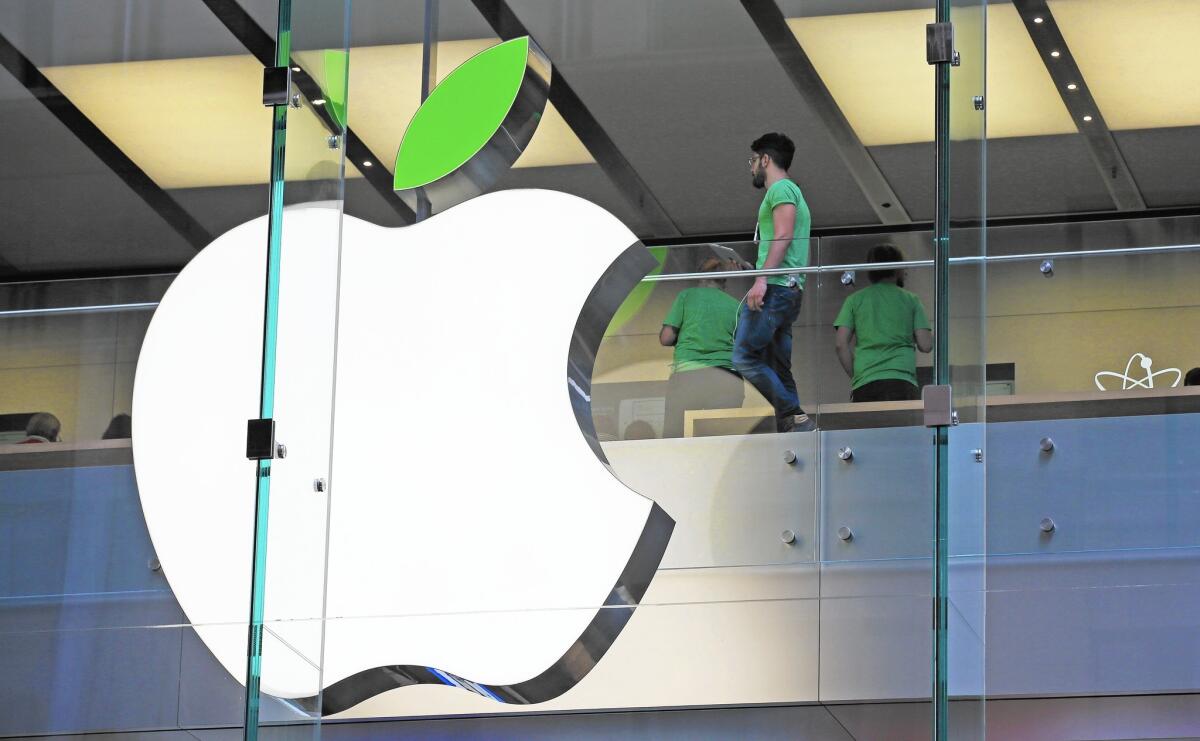Apple’s green initiative offers a smidgen of hope

- Share via
It’s easy to be cynical about big companies’ claims that they cherish the environment. If that were so, why are industrial waste and emissions among the biggest reasons our planet is so screwed up?
Every so often, though, there’s reason for hope. Or at least a smidgen of hope.
Apple announced this week that it’s working with the World Wildlife Fund to protect 1 million acres of forest land in China, where the company does most of its manufacturing.
The company also said it’s aiming for 100% of its energy, and that of its suppliers, to come from renewable sources such as solar, wind and hydropower.
“This won’t happen overnight — in fact, it will take years — but it’s important work that has to happen,” said Apple Chief Executive Tim Cook.
Considering that we’re talking about the world’s largest corporation by market capitalization, these are moves that will force people to take notice. They set a powerful example for other businesses.
They also show spineless politicians the world over that, yes, it’s possible to be socially responsible and still adhere to good old-fashioned capitalistic principles.
“Apple is really out front on environmental issues,” said Jesse Simons, chief of staff of the Sierra Club. “They’re sending a strong signal for the way the world should go.”
OK, reality check: A single company won’t save the planet, nor will it cause heavy polluters to see the error of their ways and turn over a new leaf.
But it’s painfully clear that the world’s governments are either unable or unwilling to take the necessary steps to address climate change and other environmental issues, such as protection of oceans and water sources.
So even if we have to settle for inches instead of miles, at least there’s movement in the right direction.
It’s been 18 years since the world’s nations came together to sign the Kyoto Protocol for protecting the planet from climate change. It required industrialized nations to cut their greenhouse gas emissions to 5% below 1990 levels by 2012.
The United States, which accounts for about 15% of global carbon dioxide emissions, never ratified the treaty. China, which represents roughly 30% of emissions, never signed. Canada pulled out in 2011.
The Intergovernmental Panel on Climate Change reported last month that the volume of greenhouse gases spewing into the atmosphere “grew more quickly between 2000 and 2010 than in each of the three previous decades.”
Let’s give politicians the benefit of the doubt: When they bury their heads in the sand and pretend that we’re not irreversibly fouling our nest, they have other considerations on their mind.
Former President George W. Bush justified climate-change denial when he said in 2005 that ratifying the Kyoto treaty would have “wrecked” the U.S. economy.
What he really was saying was that it would have been bad for business — the energy business in particular. Fossil-fuel-powered electricity plants account for more than a third of carbon dioxide emissions in this country, according to the Environmental Protection Agency.
“Kyoto is an example of the fossil-fuel industry rising up and trying to hold us back,” said Gary Cook, a senior policy analyst for Greenpeace.
That’s why a little whoopee is warranted when a company of Apple’s clout demonstrates that doing well economically and doing right environmentally can go hand in hand.
Apple sells a lot of gadgets, and those gadgets require paper packaging. The company says that by helping safeguard a million acres of forest, it will try to achieve a “net-zero impact on the world’s supply of sustainable virgin fiber.”
What that means in plain English is that Apple wants all its packaging to come from renewable sources so that a surge in iPhone sales won’t result in a decline in trees.
“We believe we can run on naturally renewable resources and ensure that we protect — and create — as much sustainable working forest as needed to produce the virgin paper in our product packaging,” said Lisa Jackson, Apple’s vice president of environmental initiatives.
The company hasn’t always been an environmental leader. It was criticized by activists in the past for being secretive about its operations and not disclosing how production and use of its devices affected the planet.
Steve Jobs committed the company in 2007 to doing a better job on the environmental front, and unlike many such corporate declarations, this one apparently was serious.
Greenpeace ranks electronics companies for their environmental awareness. In 2006, Apple scored just 2.7 out of 10 points. In 2012, the latest report card available, Apple advanced to 4.5 out of 10 but was still hit for not being transparent enough in reporting gas emissions and management of toxic chemicals.
“We don’t want to debate climate change,” the company announced in its 2015 Environmental Responsibility Report. “We want to stop it.”
By no means is Apple the only company to seemingly get its priorities straight.
A list of 116 environmentally savvy businesses compiled by the Pennsylvania nonprofit B Lab includes Los Angeles’ Falcon Waterfree Technologies, which sells waterless urinals, and Santa Monica’s the Honest Company, which produces safer household goods, such as diapers and cleaning products.
Simons at the Sierra Club said the efforts of companies large and small, along with state and local governments, will gradually steer Washington in the right direction.
“All these entities make up a bigger portion of the economy than the fossil fuel industry,” he said. “When national leaders see what companies like Apple are willing to do, they see that it’s possible to make stronger commitments.”
Are we out of the woods, environmentally speaking? Not by a long shot. The need for concerted action by the public and private sectors grows more urgent with each passing year.
However, a company of Apple’s stature can show that protecting the environment isn’t just responsible behavior. It’s good business.
How many iPhones will people buy, after all, when the seas have risen and we’re all underwater?
David Lazarus’ column runs Tuesdays and Fridays. he also can be seen daily on KTLA-TV Channel 5 and followed on Twitter @Davidlaz. Send your tips or feedback to david.lazarus@latimes.com.
More to Read
Inside the business of entertainment
The Wide Shot brings you news, analysis and insights on everything from streaming wars to production — and what it all means for the future.
You may occasionally receive promotional content from the Los Angeles Times.










